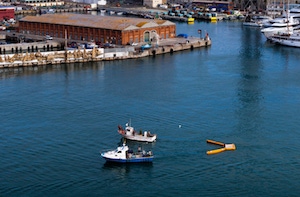'Trash Catchers' a novel solution for capturing and recycling ocean debris
Researchers have found that 10 rivers—eight in Asia and two in Africa—account for as much as 95% of the total global load of plastics in the oceans. These waterways are ideal locations to place nets to collect plastic waste before it ends up in oceans and send it to recycling centers.
October 27, 2017

We all know that plastic waste doesn’t get into the oceans of the world by itself. Rivers that flow from inland areas to the seas have increasingly been identified as major transporters of marine litter. According to a report from Waste Free Oceans (WFO; Brussels), researchers at the Helmholtz Institute, one of a group of scientific research centers located throughout Germany, analyzed dozens of articles on plastic pollution in waterways, with samplings at 79 sites along 57 rivers around the world.
|
Trash Catchers can be easily pulled by boats to collect waste floating on the surface of waterways. |
They found that the top 10 rivers carrying the largest amount of plastic waste accounted for 88 to 95% of the total global load of plastics in the oceans. Halving plastic pollution in these 10 waterways—eight of which are in Asia and two in Africa—could potentially reduce the total contribution by all rivers by 45%.
It has been estimated in previous research that the Yangtze dumps some 727 million pounds of plastic into the sea each year. The Ganges River in India is responsible for even more—about 1.2 billion pounds.
The rivers with the highest estimated plastic loads are characterized by a large population and “high rate of mismanaged plastic waste product per capita as a result of a not fully implemented municipal waste management system,” according to lead researcher Christine Schmidt. WFO is focused on collecting and recycling ocean plastic, and determined that these rivers are ideal locations to place its plastics filtration nets, called Trash Catchers.
The Trash Catchers, created by Thierry Thomazeau, President and founder of Thomsea, a company specialized in developing ways to clean up ocean debris, can collect floating debris without significant bycatch, as the trawl only extends into the waters by 70 cm, said WFO.
The filtration nets, successfully trailed at harbors and coasts in Europe, can be easily pulled by boats navigating small rivers or placed in a river bed, collecting waste floating on the water’s surface. Once the collection net is full, the accumulated debris is retrieved from the water with a crane and taken to local waste sorting and recycling centers.
After separating and cleaning the waste, it can be transformed into new raw material for product creation. Where contamination levels are too high, the catch can be used for energy generation. Waste Free Oceans then partners with brands wanting to use retrieved debris to contribute to a circular economy.
WFO is currently preparing the installation of its debris catcher in a river channel in Mumbai. Setting up collection nets to gather floating plastic in waste hotspots and combining it with the development of infrastructures to recycle and recover debris is the way forward, said the WFO.
WFO noted that coastal cities, waste-polluted rivers and areas with large waste accumulation can install the Trash Catcher nets as a long-term answer to debris, thus eliminating hand picking via beach cleanups. WFO adds that it is looking to set up partnerships with any organization willing to support the vision of a cleaner world.
About the Author(s)
You May Also Like





